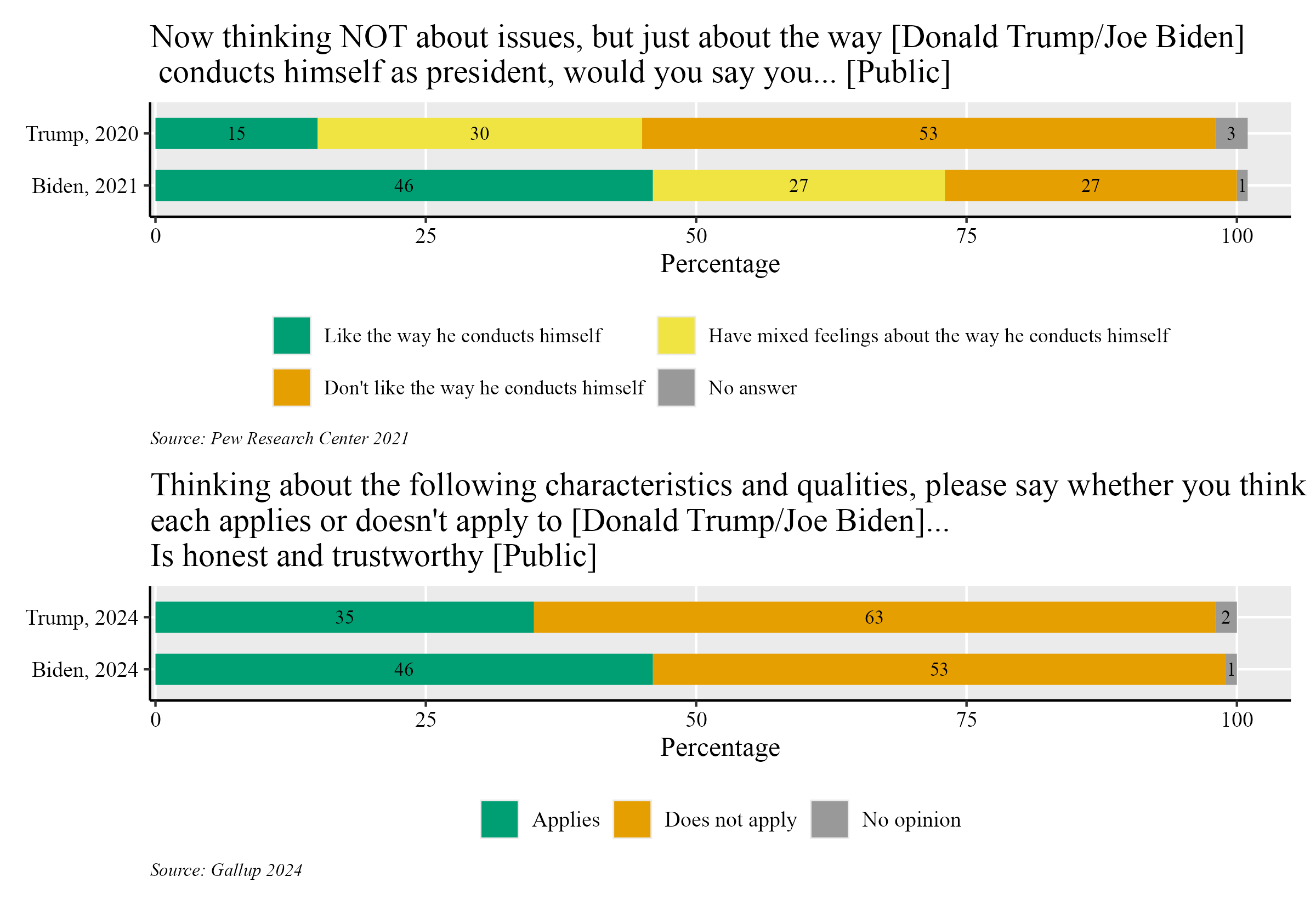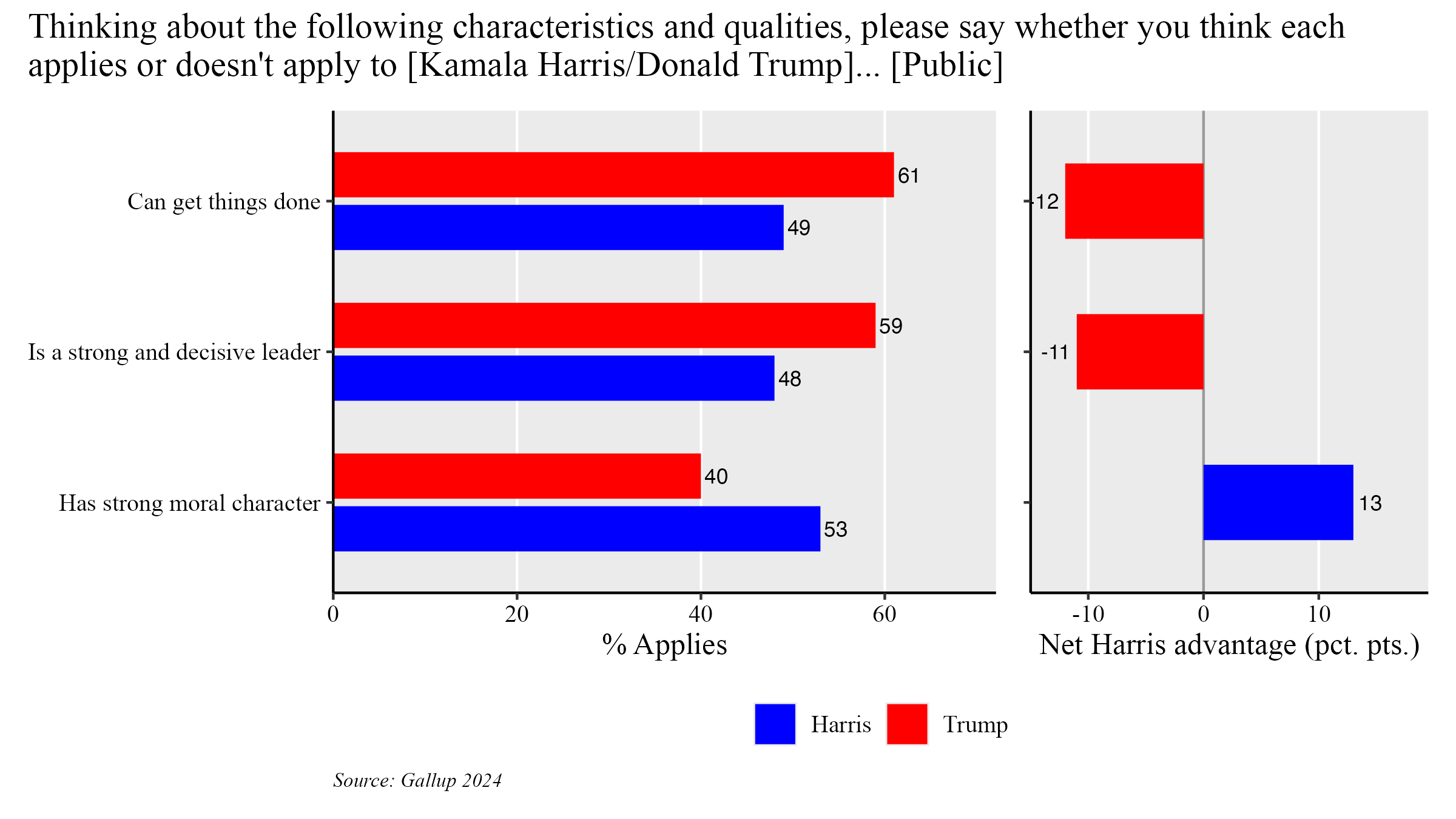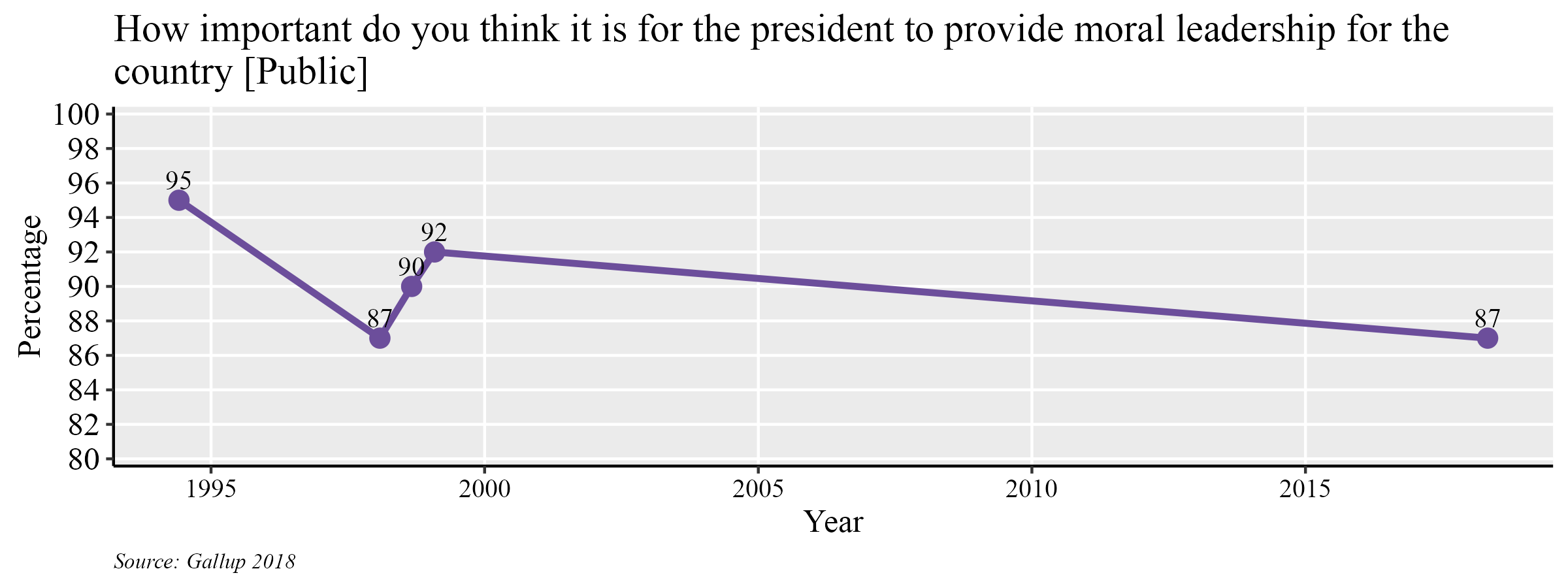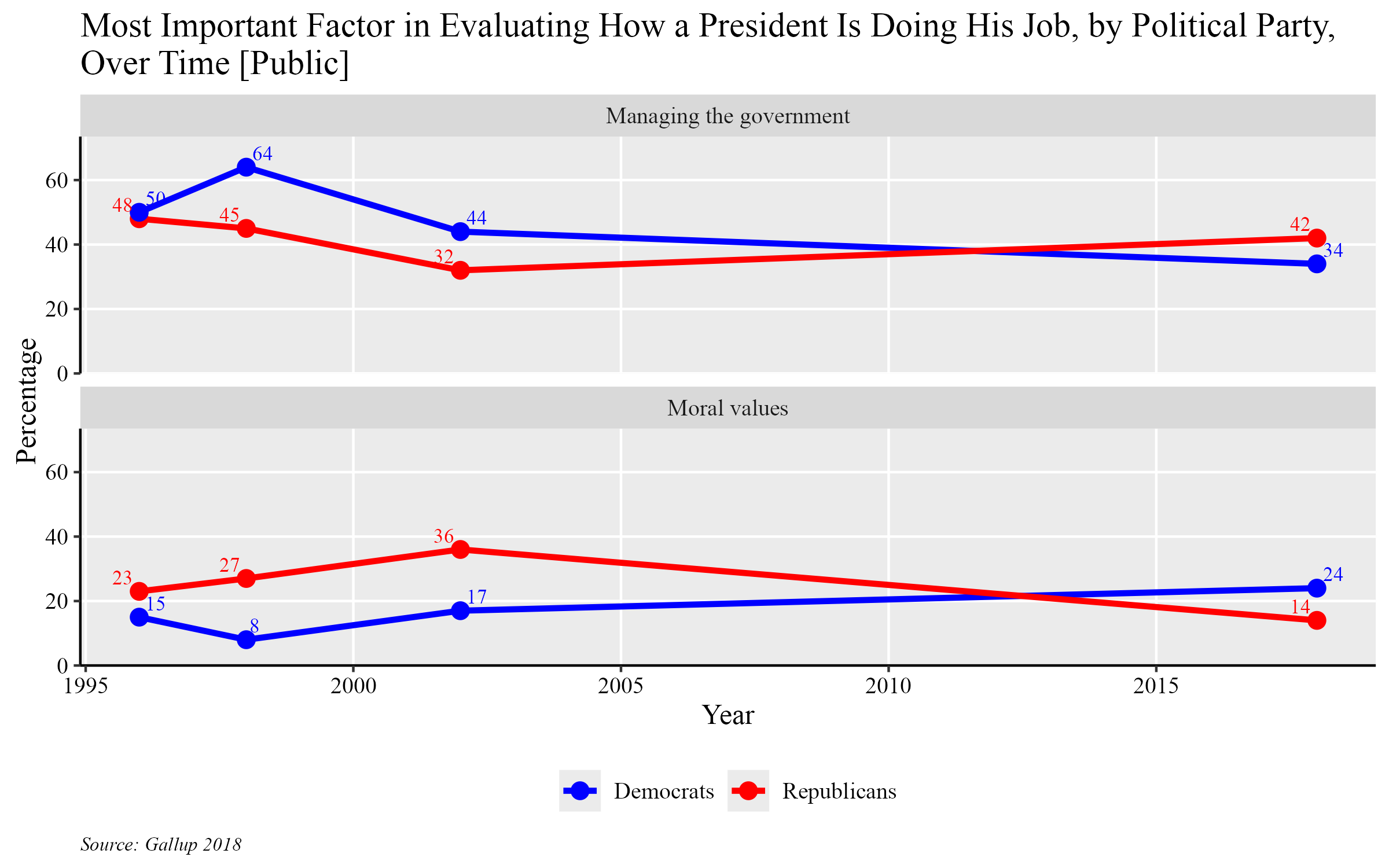By Marissa Romero
September 5, 2025
Introduction
American political opinion is difficult to generalize, whether based on specialization in politics, partisanship, or the personal qualities desired in a leader. While many scholars disapprove of the actions and policies undertaken by the Trump administration during his second term, the general public has been more divided. Furthermore, party loyalty among scholars and the public differs widely when it comes to choosing a political leader. Least accounted for may be the personal opinions between both groups, varying in how closely they align with their political views.
Using a combination of public polls and scholar surveys from the Teaching, Research and International Policy (TRIP) Project, I will explore the rift between public and scholar opinion on what a good leader looks like, how influential partisanship is in both groups, and the gradual shift in the qualities Americans prefer in leaders. This blog post will explore perceptions of world leaders by focusing on President Trump in his second term, while also drawing comparisons to past American presidents. By examining approval in the first 100 days, perceptions of leadership qualities, and foreign policy performance, this post will highlight a potential shift in American political values and a growing separation between the public and scholars on what makes a good leader.
100 Days Comparisons
Each administration’s first 100 days in office are indicative of the initial support they received when first in office. Biden and Trump’s overall approval ratings and foreign policy stances received varying support from both the public and scholars based on performance and confidence.
Public polls at the start of each candidate’s term showed that Biden was viewed more favorably in his first 100 days than Trump in his first term or second term. Trump’s overall approval rating stood at 39%, compared to Biden’s 59% at the same point in his first term. Comparatively, by his second 100 days in 2025, Trump’s approval had fallen to 40%. This drop may imply a general loss in confidence from the public in Trump’s performance.

During each presidency’s first 100 days, public polls also asked about each administration’s foreign policy performance. When respondents were first asked in a 2025 poll whether Trump could make good foreign policy decisions, 44% expressed confidence in him. But when asked to compare Trump’s policies with Biden’s, nearly half said Trump’s policies would leave the U.S. in a weaker international position, while 38% said they would make the U.S. stronger.
From scholars’ viewpoints, Biden received higher support in his foreign policy performance than Trump during his first 100 days. Eighty percent of scholars said Biden was doing well in this area, while fewer than three percent said the same about Trump. The overwhelming consensus among experts was that Trump’s foreign policy initiatives were not performing well.

Trump also fared poorly when compared to other Democratic leaders. When asked to choose between Trump and Harris, only eight percent of experts believed that Trump would more effectively manage foreign policy issues facing the U.S. More than 90% believed Harris would be more effective than Trump in achieving her foreign policy goals.
Scholars were also asked to evaluate each president’s handling of key foreign policy issues at the 100-day mark, including climate change, immigration, national security, international trade and international human rights. Across every issue, experts expressed greater approval for Biden in 2021 than for Trump in 2025. The sharpest contrast was on climate change: 93% of scholars approved of Biden’s handling, while only five percent approved of Trump’s. When directly compared to each other in 2020, scholars agreed the Biden administration would manage current foreign policy issues more effectively than Trump.
When asked about their party affiliation, the overwhelming majority of scholars identified themselves as Democrats. About two-thirds of scholars identified as Democrats, while only three percent identified as Republicans. Still, 17% of Republican experts said that Biden performed well or very well on foreign policy during his first 100 days in office, and one-third rated his performance as neither good nor poor, demonstrating that Biden’s support cannot be wholly attributed to party loyalty. In contrast, fewer than one percent of Democrat scholars stated that Trump performed well or very well, with the same small share saying his performance was neither good nor poor.
While Republican scholars at times supported Biden’s foreign policy decisions, they were still more likely to support Trump than their Democratic counterparts. When asked, in 2020, which candidate would be able to handle foreign policy more efficiently, Republican scholars were evenly split in choosing between Biden and Trump. Strikingly, less than one percent of Democrat scholars chose Trump. These results underscore how partisan identity shaped scholarly assessments of each president’s early foreign policy actions.

Just as scholars’ views can split based on their political affiliation, general public views do as well. Republican respondents were far more likely than Democrats to approve Trump’s foreign policy decision. However, the split among Republican scholars between the two candidates shows that partisan identity does not always guarantee support for a party’s candidate. The partisan division seen in the general American public and, at times, in scholars provides insight into how influential political affiliation is in determining what makes a good leader.
Respect as a Presidential Value
Respect is a trait that both the public and scholars consider vital for leaders and the U.S. to receive. When surveyed in 2021, nearly all experts agreed that it was important for the U.S. to be respected by other countries, and public opinion follows a similar pattern. In a public poll held in 2021, 87% of Americans said respect was somewhat or very important, a share that has since risen to 91% this year.
Where the two groups diverge is in their perception of whether the U.S. actually commands respect. Surveys in 2025 showed that 95% of scholars said respect is important, but only four percent thought that the U.S. had gained or maintained respect compared with previous years. The public was not asked this specific question. Still, about nine in ten respondents agreed respect matters, with 56% who agreed the U.S. is respected abroad. Both groups value respect, though each has different thoughts on which aspects of respect are most important in a leader and seen in the country.
Qualities Desired
Public polls provide insight into the qualities Americans have wanted in a leader over time. In 2024, one-third of Americans said that Biden was a strong and decisive leader, while 57% said Trump held those traits. While Trump scores higher on authoritative qualities, there is an even larger difference between his and Biden’s perceived personality traits.
When comparing Trump’s conduct in 2020 and Biden’s in 2021, Trump scored higher than Biden on traits of authority but lower on personal image. Nearly half of Americans (46%) said that they liked Biden’s conduct, compared with 15% for Trump’s. In 2024, 46% of Americans described Biden as honest and trustworthy, while only one-third said the same about Trump.

These public opinions are heavily split along party affiliation. Fifty-nine percent of Republicans disliked the way Biden conducted himself as president, while the majority of Democrats (85%) said the same about Trump. In both cases, respondents were far more critical of the opposing party’s candidate, with smaller percentages of Americans saying they could agree with the opposition.
Trump’s job performance approval since beginning his second term has deeply followed partisan lines. His overall approval hit a low of 37% in July 2025, yet Republican support remained strong with about 90% approving of his performance, demonstrating a stark contrast to Democrats’ mere two percent and Independents at 29%. On foreign affairs, Trump received only three percent approval from Democrats and 33% from Independents, but 93% approval from Republicans.
In the final months of Biden’s term, leading up to the 2025 inauguration, many Americans grew dissatisfied with his leadership. By early 2025, half of Americans (51%) were dissatisfied with the U.S. role in foreign affairs, and 58% believed the U.S. had lost global standing under Biden. Only one in three said Biden was performing his duties well.
On specific traits, the partisan divide was stark. Only five percent of Republicans said Biden was a strong leader, compared with 62% of Democrats. Just six percent of Republicans described him as mentally sharp, versus 53% of Democrats. On effectiveness, eight percent of Republicans said he could get things done, compared with 64% of Democrats. A majority of Democrats, 72%, described him as honest, but only 11% of Republicans agreed.
A Different Kind of Race
The 2024 election highlighted what Gallup called a race between character and leadership skills. Trump held an 11 percentage point advantage over Harris on being a strong and decisive leader, and a 12 percentage point lead in the ability to get things done. While Trump outperformed Harris on decisiveness, Harris outscored him on moral character, leading by 13 percentage points. Nine in ten Democrats attributed strong moral character to Harris, while 82% of Republicans said the same about Trump. In 2023, nearly half of Americans said the word “moral” described Biden quite or extremely well, compared with only 35% who said the same about Trump.

These results reflect a longer-term shift in values across parties. In 1994, 95% of Americans said moral leadership was either very or somewhat important in a president. When asked again, moral leadership’s importance dipped below 90% in early 1998 before gradually rising throughout the year to 92% in 1999. By 2018, only 87% of Americans thought it to be of importance, the same as the decreased percentage seen in early 1998. This may demonstrate a trend where morals’ importance becomes secondary to other qualities, such as decisiveness.

Americans are prioritizing managerial capabilities (37%) above moral values (21%) when asked, in 2018, which of the following characteristics is the most important factor when rating how a president is handling his job. This is most evident among Republican voters. Forty-two percent of Republicans said that managing the government was the most important factor compared with 34% of Democrats. Democrats were more likely (24%) to prioritize a leader’s moral values, versus 14% of Republicans. This reflects the deeper partisan divide for preferred leadership traits.
From 1996 through 2002, Republicans consistently rated moral values as more important in evaluating a president than Democrats did, while Democrats consistently placed greater importance on managing the government. In 2018, this pattern reversed, with Democrats placing greater emphasis on moral values and Republicans placing greater weight on managing the government. The shift in values represents the polarization between the two major parties, where certain leadership qualities are becoming attributed to one party.

Conclusion
The divide between Americans cannot be reduced to a single affiliation. Among both scholars and the public, support for a candidate often depended on their personal qualities or policy goals. While both tended to align with their party membership, this pattern was more pronounced among the public. Moreover, the qualities that each party seeks in a leader are shifting from broad leadership traits to more personal characteristics. These divisions reveal a gradual change in the qualities that Americans want in a leader, contributing to the growing polarization of American politics.